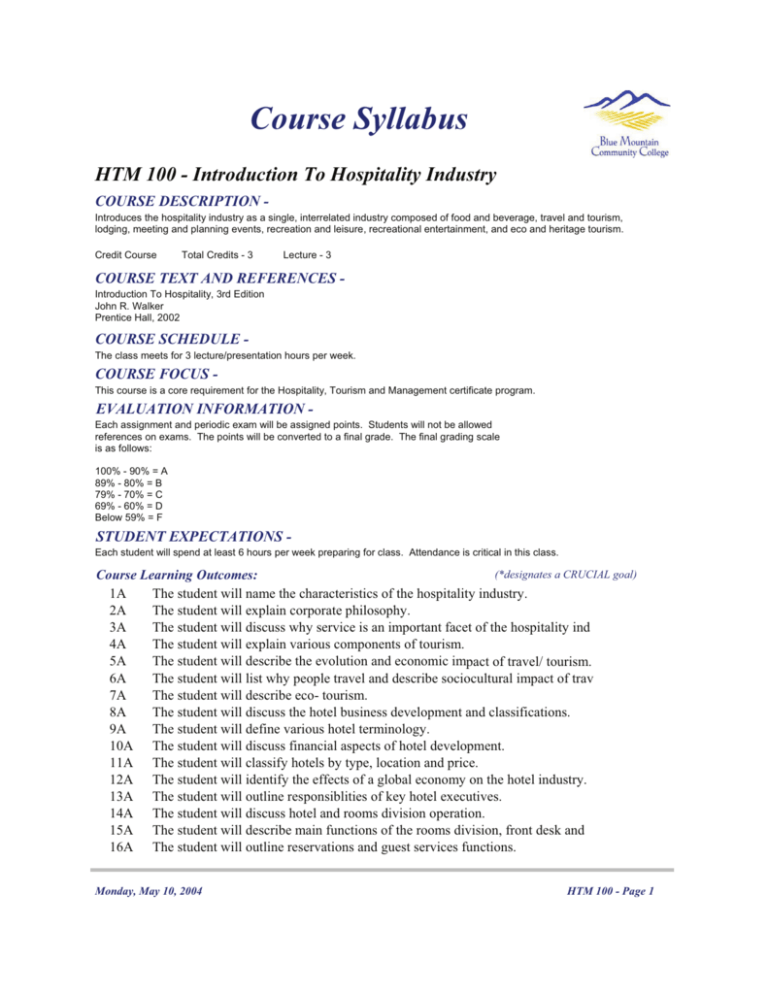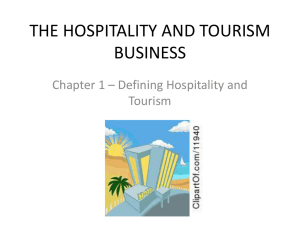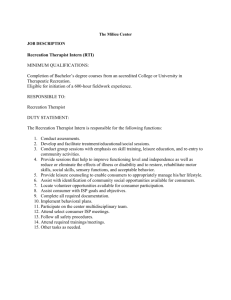HTM 100
advertisement

Course Syllabus HTM 100 - Introduction To Hospitality Industry COURSE DESCRIPTION Introduces the hospitality industry as a single, interrelated industry composed of food and beverage, travel and tourism, lodging, meeting and planning events, recreation and leisure, recreational entertainment, and eco and heritage tourism. Credit Course Total Credits - 3 Lecture - 3 COURSE TEXT AND REFERENCES Introduction To Hospitality, 3rd Edition John R. Walker Prentice Hall, 2002 COURSE SCHEDULE The class meets for 3 lecture/presentation hours per week. COURSE FOCUS This course is a core requirement for the Hospitality, Tourism and Management certificate program. EVALUATION INFORMATION Each assignment and periodic exam will be assigned points. Students will not be allowed references on exams. The points will be converted to a final grade. The final grading scale is as follows: 100% - 90% = A 89% - 80% = B 79% - 70% = C 69% - 60% = D Below 59% = F STUDENT EXPECTATIONS Each student will spend at least 6 hours per week preparing for class. Attendance is critical in this class. (*designates a CRUCIAL goal) Course Learning Outcomes: 1A The student will name the characteristics of the hospitality industry. 2A The student will explain corporate philosophy. 3A The student will discuss why service is an important facet of the hospitality ind 4A The student will explain various components of tourism. 5A The student will describe the evolution and economic impact of travel/ tourism. 6A The student will list why people travel and describe sociocultural impact of trav 7A The student will describe eco- tourism. 8A The student will discuss the hotel business development and classifications. 9A The student will define various hotel terminology. 10A The student will discuss financial aspects of hotel development. 11A The student will classify hotels by type, location and price. 12A The student will identify the effects of a global economy on the hotel industry. 13A The student will outline responsiblities of key hotel executives. 14A The student will discuss hotel and rooms division operation. 15A The student will describe main functions of the rooms division, front desk and 16A The student will outline reservations and guest services functions. Monday, May 10, 2004 HTM 100 - Page 1 17A 18A 19A 20A 21A 22A 23A 24A 25A 26A 27A 28A 29A 30A 31A The student will list challenges of the concierge, housekeeping and and security The student will define duties of a food/beverage director. The student will state functions of the food/beverage departments. The student will perform computations using key food/beverage operating ratio The student will discuss various aspects of the recreation/ leisure industry. The student will connect the relationship of recreation and leisure to wellness. The student will distinguish between commercial and noncommercial recreatio The student will name and describe various types of recreational clubs. The student will explain the difference between meetings, expositions and conv The student will name the main hospitality industry associations. The student will describe the role of a meeting planner. The student will list the steps in event management. The student will explain primary responsibilities of a convention/vistors bureau The student will understand how internships, mentoring and job shadowing aid The student will understand hotel operations food and beverage division. Performance Objectives: 1A The student will name the characteristics of the hospitality industry. Student reponses should include information about corporate philosophy, missions, goals, objectives/strategies, service, TQM and how companies strive for excellence. Applies to the following goal(s): 1A 2A 3A 30A name the characteristics of the hospitality industry explain corporate philosophy discuss why service is an important facet of the hospitality industry understand how internships, mentoring and job shadowing aid in choosing career paths 4A The student will explain various components of tourism. Student responses should outline the major influences on the increase in tourism, the various travel modes, and the key organizations and role they play from a local to a global perspective. Applies to the following goal(s): 4A 5A 6A 7A explain various components of tourism describe the evolution and economic impact of travel/ tourism list why people travel and describe sociocultural impact of travel/tourism. describe eco- tourism 8A The student will discuss the hotel business development and classifications. Student responses should illustrate the various forms of hotel development, the different types of hotels, their classifications and ways to cater to the business and leisure travel markets. Applies to the following goal(s): 8A 9A 10A 11A 12A discuss the hotel business development and classifications define various hotel terminology discuss financial aspects of hotel development classify hotels by type, location and price identify the effects of a global economy on the hotel industry 13A The student will discuss hotel and rooms division operation. Student responses should give perspectives that details the rooms division department functions and activities, including a complete overview of the guest cycle from reservations to checkout. In addition, students should cover duties and responsibilities of key executives and department heads. Applies to the following goal(s): 13A outline responsiblities of key hotel executives 14A discuss hotel and rooms division operation 15A describe main functions of the rooms division, front desk and night auditor Monday, May 10, 2004 HTM 100 - Page 2 16A outline reservations and guest services functions 17A list challenges of the concierge, housekeeping and and security departments 18A The student will understand hotel operations food and beverage division. Student responses should include detail processes of the food and beverage deparments and illustrate the duties and responsibilities of key food/beverage executives. Applies to the following goal(s): 18A 19A 20A 31A define duties of a food/beverage director state functions of the food/beverage departments perform computations using key food/beverage operating ratios understand hotel operations food and beverage division 21A The student will discuss various aspects of the recreation/leisure industry. Student repsonses should include how recreation/leisure are essential to our cultural, moral and spiritual well-being. Students should identify both government-sponsored recreation, national parks, public recreation agencies along with commercial recreation/theme parks and clubs. Noncommericial recreation in the form of voluntary organizations, campus, armed forces and employee recreation should be included. Applies to the following goal(s): 21A 22A 23A 24A discuss various aspects of the recreation/ leisure industry connect the relationship of recreation and leisure to wellness distinguish between commercial and noncommercial recreation name and describe various types of recreational clubs 25A The student will explain the difference between meetings, expositions and conventions. Student responses should illustrate roles of meeting planners, convention planning, and exposition planning. Applies to the following goal(s): 25A 26A 27A 28A 29A explain the difference between meetings, expositions and conventions name the main hospitality industry associations describe the role of a meeting planner list the steps in event management explain primary responsibilities of a convention/vistors bureau authority Monday, May 10, 2004 HTM 100 - Page 3




